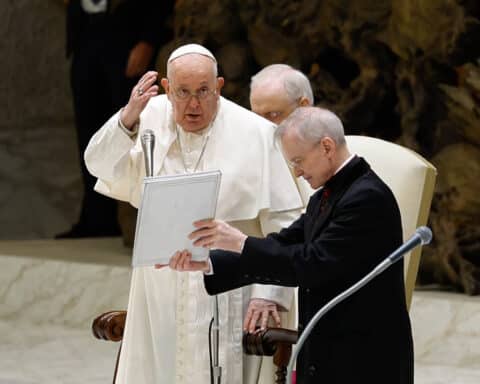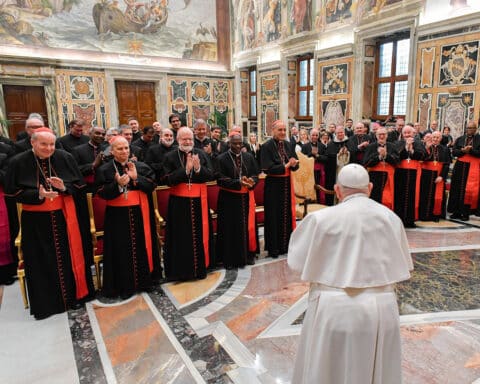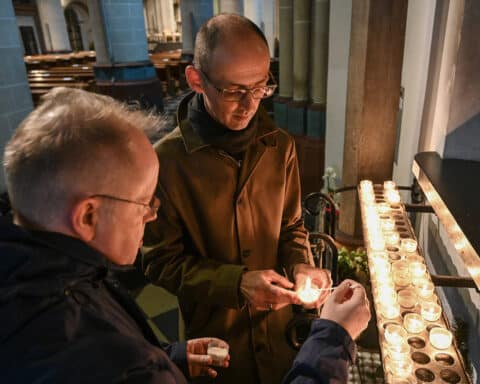
— Name withheld, via email
Answer: We cannot earn salvation. We are saved by the grace of faith working through love (cf. Gal 5:6). Over the years, Catholics and Protestants have differed in the emphasis of faith alone or of faith and works.
The central problem with the faith and works controversy is the tendency to separate what God has joined. Consider a candle flame. Though in our mind we can separate the heat of the flame from the light of the flame, we could never take a knife and split the two. They are so together as to be one. And so it is with faith and the works of faith. Faith is a fruit-bearing tree. If you were to point to a tree in your yard and call it an orange tree, then oranges ought to appear in the branches yearly. If not, I can say it is not really an orange tree, no matter what you claim. It is the nature of an orange tree to produce oranges, and it is the nature of true faith to bear the fruit of God’s works.
While we are not saved by the works, they are a sign that true faith is active in us. St. Paul writes: “For by grace you have been saved through faith, and this is not from you; it is the gift of God; it is not from works, so no one may boast. For we are his handiwork, created in Christ Jesus for the good works that God has prepared in advance, that we should live in them” (Eph 2:8-10). Thus, while we are saved by grace through faith, works necessarily follow if it is true faith. Further, our good works are not our gift to God, but his gift to us. St. James says, “faith without works is dead” (Jas 2:26). In other words, it isn’t true or living faith at all. Jesus says, “Why do you call me ‘Lord, Lord,’ but not do what I command?” (Lk 6:46).
So obedience to the commandments is tied to faith, hence faith is never alone; it is inseparable from obedience to works and behaviors God has tied to it. While we are not saved by the works themselves, the works manifest a true and saving faith.
Exorcisms and blessings
Question: Is there a difference between a blessed object versus an exorcised object? Is there a difference in terms of effect or efficacy? Can you have certain objects, such as rosaries or medals, exorcised, and if so, would this have any added benefit as opposed to a standard blessing?
— Joseph Fure, via email
Answer: In the older rites of the Church, there were certain solemn blessings that were preceded by an exorcism. This included holy water, salt and oil (and sometimes fields and places). The purpose was to first drive out the presence of evil and any demons, and then bless these elemental things. Demons are often thought to be associated with these basic elements of nature, especially water. The old ritual did not extend exorcisms to other objects such as rosaries and medals.
And exorcism is not a blessing per se. It is more of a preparation for a blessing wherein any evil presence is commanded to depart prior to a blessing. St. Thomas Aquinas, defending the many exorcisms that were part of the old Rite of Baptism, says, “The power of the devil is restrained, by prayers, blessings and the like, from hindering the sacramental effect” (Summa Theologiae, III, q. 66, a. 10) He goes on in the same place to liken such exorcisms in Baptism to removing thorns and weeds from a field prior to planting seeds. This process was to improve the fruitfulness of seeds. This is the added benefit of which you speak.
However, a baptism, prior exorcisms or not, is still a baptism. Likewise, blessed things, including water, salt and oil, with or without a previous exorcism, are still blessed. Using St. Thomas’ teaching, exorcisms help the blessing to be more fruitful and efficacious. The old ritual (which can still be used today), however, did not extend exorcisms prior to the blessings of most things.
Msgr. Charles Pope is the pastor of Holy Comforter-St. Cyprian in Washington, D.C., and writes for the Archdiocese of Washington, D.C. at blog.adw.org. Send questions to msgrpope@osv.com.





